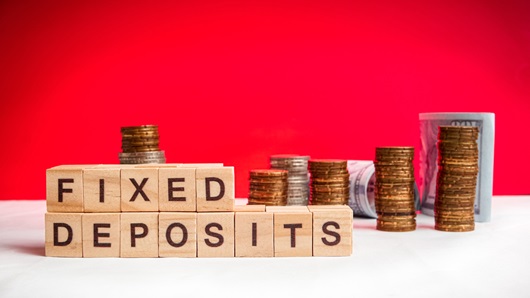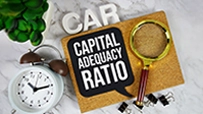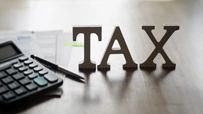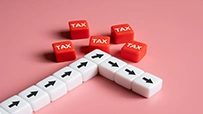The Role of Fixed Deposits in Retirement Planning
September 04, 2025

Retirement planning is an essential aspect of financial management that requires careful consideration and strategic investment choices. As you plan for your post-employment years, it's important to explore various investment options that can provide stability, security, and reliable returns. Among these options, Fixed Deposits (FDs) stand out as a valuable asset in retirement planning due to their safety, guaranteed returns, regular income stream, and risk management capabilities.
In this article, we will delve into the role of Fixed Deposits in retirement planning and discuss why they are a preferred choice for individuals looking to secure a financially independent future. Whether you're just starting your career or approaching retirement age, understanding how FDs can contribute to your retirement goals is crucial.
How FDs Can Help You Plan Your Retirement
Here's how FDs can help you plan your retirement.
1. Capital Preservation: Ensuring Safety and Stability
In terms of investing, one of the primary concerns is preserving capital while generating steady returns. Market-linked investments can be subject to fluctuations, making them unreliable for retirees who seek stability. On the other hand, fixed deposits offer safety and stability by providing a secure avenue for preserving capital.
FDs are offered by reputable banks and financial institutions, backed by robust regulatory frameworks. They offer a predetermined interest rate and a fixed tenure, allowing retirees to rely on a steady income stream without worrying about market volatility. This stability provides peace of mind during retirement years when financial security is paramount.
2. Reliable Earnings: Ensuring Consistent Returns
Retirees value a predictable income flow during their post-retirement years, which is precisely what FDs offer. FD interest rates are fixed at the time of investment, enabling retirees to calculate and plan their future income accurately. This predictability helps in budgeting, managing expenses, and ensuring a comfortable lifestyle throughout retirement.
Let's say you invest ₹10 lakh in a fixed deposit with an interest rate of 6% per annum for a tenure of five years. Using an online FD ROI Calculator, at the end of the tenure, you are eligible to receive ₹12.94 lakh as the maturity amount. The assured return allows you to plan your finances effectively and make informed decisions based on your expected income.
3. Flexible Income: Tailoring Your Regular Interest Payouts
Fixed Deposits can be structured to provide a regular income stream during retirement. Retirees can choose to receive interest pay-outs at regular intervals, such as monthly, quarterly, or annually, depending on their cash flow requirements. By opting for regular interest payments, retirees can cover their day-to-day expenses and maintain a consistent standard of living without depleting their principal amount.
For example, let's consider a retiree who has invested ₹20 lakh in a fixed deposit with an interest rate of 7% per annum for a tenure of ten years. If they choose to receive quarterly interest payments, they will receive ₹35,000 every three months as an additional income source.
4. Navigating Uncertainty: How Diversification Enhances Stability
Retirement planning involves diversifying investments to mitigate risk and ensure a balanced portfolio. While it's advisable to have a mix of asset classes like equities, bonds, and real estate, FDs offer an essential element of stability to the overall portfolio. They act as a low-risk asset that helps retirees preserve capital and reduce exposure to market volatility.
During uncertain economic conditions, when other investments might suffer from downward trends or market crash, Fixed Deposits provide a safety net. They offer a reliable source of income and can help retirees navigate challenging financial situations without compromising their financial security.
5. Emergency Readiness: Ensuring Liquidity and Access to Funds
Another crucial aspect of fixed deposits is having access to funds in case of emergencies or unexpected expenses. While fixed deposits have a specific tenure, they offer a level of liquidity that can be essential during retirement. In situations where immediate funds are required, retirees have the option to make premature withdrawals or take a loan against their fixed deposit. Please note that Ujjivan SFB doesn't levy any penalty fee for premature withdrawal of deposits made after 6 months from the time of opening the account.
Having a portion of retirement savings in fixed deposits acts as a reliable emergency fund, providing a sense of financial security during unforeseen circumstances. This flexibility ensures that retirees can access their funds when they need them most, without having to liquidate other long-term investments.
6. Maximising Returns: The Role of Tax Benefits
Tax-Saver Fixed Deposits offer tax benefits under Section 80C of the Income Tax Act, 1961. However, such FDs come with a lock-in period of 5 years, meaning you cannot withdraw funds before the maturity date. Retirees should consult with a tax professional or financial advisor to understand the specific tax benefits associated with fixed deposits.
7. Legacy Management: The Essentials of Estate Planning
By nominating beneficiaries for fixed deposits, retirees can ensure a smooth transfer of wealth to their loved ones in the event of their demise. This helps in preserving the financial well-being of the family and ensuring a legacy for future generations.
By including fixed deposits in your estate plan, you can secure your family's future and ensure that your hard-earned assets are passed on seamlessly.
Final Thoughts
Fixed deposits are an integral part of retirement planning FD due to their safety, guaranteed returns, regular income stream, and risk management capabilities. They provide retirees with stability, liquidity, and peace of mind during their post-employment years. By incorporating fixed deposits into a comprehensive retirement plan, individuals can secure a financially independent future.
Consider your financial goals, risk tolerance, and liquidity requirements when planning for fixed deposits in retirement planning. Fixed deposits offer a reliable investment option that aligns with these considerations. If you're interested in exploring fixed deposits for retirement planning, visit Ujjivan SFB which offers a range of options to suit your needs and preferences.
Disclaimer:
The contents herein are only for informational purposes and generic in nature. The content does not amount to an offer, invitation or solicitation of any kind to buy or sell, and are not intended to create any legal rights or obligations. This information is subject to updation, completion, amendment and verification without notice. The contents herein are also subject to other product-specific terms and conditions, as well as any applicable third-party terms and conditions, for which Ujjivan Small Finance Bank assumes no responsibility or liability.
Nothing contained herein is intended to constitute financial, investment, legal, tax, or any other professional advice or opinion. Please obtain professional advice before making investment or any other decisions. Any investment decisions that may be made by the you shall be at your own sole discretion, independent analysis and evaluation of the risks involved. The use of any information set out in this document is entirely at the user’s own risk. Ujjivan Small Finance Bank Limited makes no representation or warranty, express or implied, as to the accuracy and completeness for any information herein. The Bank disclaims any and all liability for any loss or damage (direct, indirect, consequential, or otherwise) incurred by you due to use of or due to investment, product application decisions made by you on the basis of the contents herein. While the information is prepared in good faith from sources deemed reliable (including public sources), the Bank disclaims any liability with respect to accuracy of information or any error or omission or any loss or damage incurred by anyone in reliance on the contents herein, in any manner whatsoever.
To know more about Ujjivan Small Finance Bank Products Visit:"https://www.ujjivansfb.in"
All intellectual property rights, including copyrights, trademarks, and other proprietary rights, pertaining to the content and materials displayed herein, belong
to Ujjivan Small Finance Bank Limited or its licensors. Unauthorised use or misuse of any intellectual property, or other content displayed herein is strictly prohibited and the same is not intended for distribution to, or use by, any person in any jurisdiction where such distribution or use would (by reason of that person’s nationality, residence or otherwise) be contrary to law or registration or would subject Ujjivan Small Finance Bank Limited or its affiliates to any licensing or registration requirements.
FAQs
1. Can I withdraw money from my fixed deposit before maturity?
Yes, fixed deposits in retirement planning offer flexibility for premature withdrawals. However, there may be penalties or reduced interest rates associated with early withdrawals.
2. What happens to the interest rate if I break my fixed deposit?
In most cases, breaking a fixed deposit before maturity leads to a reduction in the interest rate earned on the deposit.
3. Are fixed deposits safe?
Yes, fixed deposits in retirement planning are considered safe due to their low-risk nature and backing by reputable banks and financial institutions.
4. Can I take a loan against my fixed deposit?
Yes, you can avail of a loan against your fixed deposit as collateral. The loan amount is typically a percentage of the deposit value.
5. Are the returns on fixed deposits taxable?
Yes, the interest earned from fixed deposits is subject to tax as per the prevailing tax laws in the country.
6. What is the minimum amount required to open a fixed deposit?
The minimum amount required to open a fixed deposit varies depending on the bank or financial institution. It can range from as low as ₹1,000 to larger amounts.
7. Can I add more funds to an existing fixed deposit?
In most cases, you cannot add more funds to an existing fixed deposit. However, you can open a new fixed deposit with additional funds.
8. Can I choose the frequency of interest payouts for my fixed deposit?
Yes, most banks and financial institutions offer options to choose the frequency of interest payouts, such as monthly, quarterly, or annually.
9. Is there a limit on the maximum tenure for fixed deposits?
The maximum tenure for fixed deposits varies depending on the bank or financial institution. It can range from a few months to several years.
10. Can I nominate multiple beneficiaries for my fixed deposit?
Yes, you can nominate multiple beneficiaries for your fixed deposit by submitting the required nomination form.
Latest Blogs

Capital Adequacy Ratio (CAR): Meaning, Formula, and RBI Norms
Banks run on trust — but trust alone cannot guarantee stability. A sudden surge in bad loans or a market shock can quickly weaken even the largest institutions.

ITR Filing Penalties: What You’ll Pay in Fees, Interest, and Compliance Costs
The Income Tax Department extended the ITR filing deadline for FY 2024–25 to September 15, 2025, giving taxpayers a second chance after the original due date lapsed.

Marginal Tax Relief for FY 2025-26: How India’s New Rule Helps You Save Income Tax
The Union Budget 2025 introduced a major income tax relief for the middle class – making annual incomes up to ₹12 lakh completely tax-free* under the new regime.

APK Fraud: How One Wrong Download Could Empty Your Bank Account
Picture this. You’re sipping your evening tea when your phone rings.

Gold Loan LTV Ratio Explained (75% to 85%): What It Means for Borrowers
In June 2025, the Reserve Bank of India (RBI) introduced a significant relaxation for gold loan borrowers: the maximum Loan-to-Value (LTV) ratio for loans below ₹2.5 lakh was raised to 85%, up from the long-standing cap of 75%. Loans between ₹2.5 lakh and ₹5 lakh can now go up to 80%, while loans above ₹5 lakh continue under the 75% ceiling.





